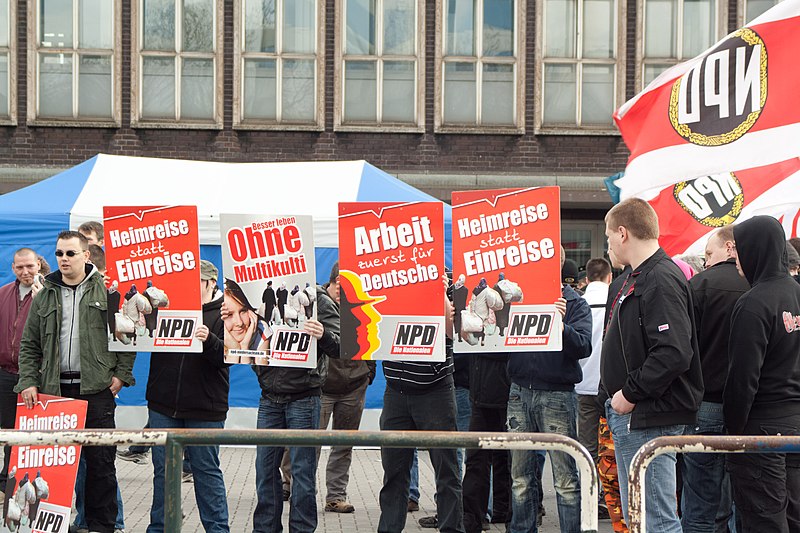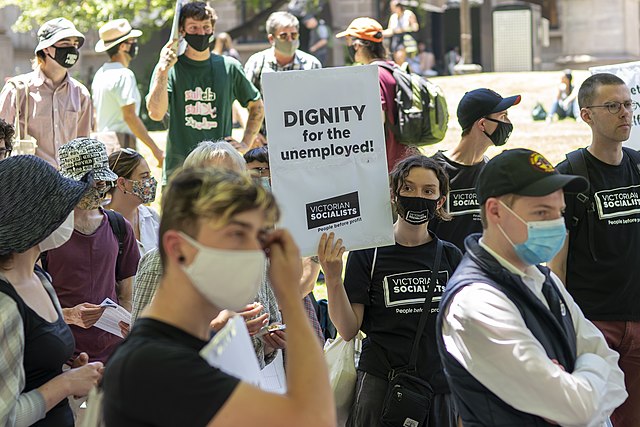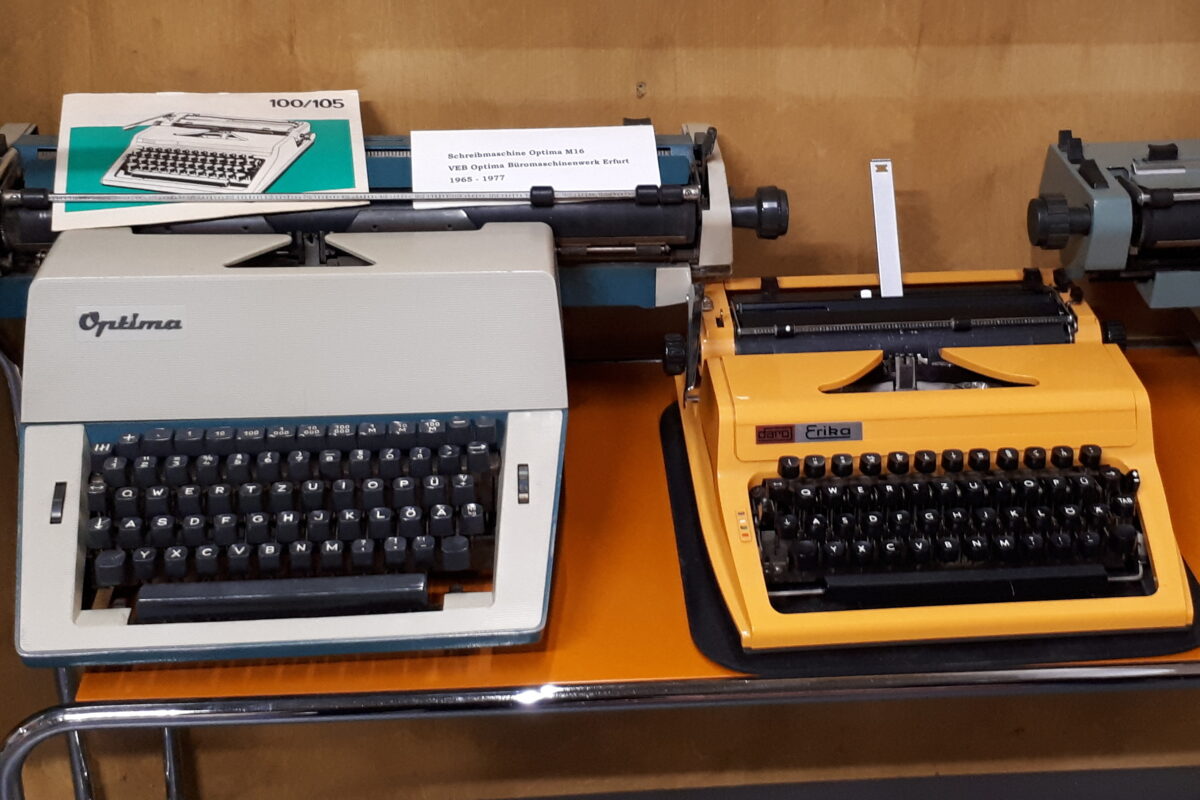We are international students who fled the war in Ukraine — we are Black, Indigenous, and people of color without Ukrainian citizenship.
Together with students in FU, HU, TU, UdK, BHT, and more supporters, we have written an open letter and demands addressing the unequal treatment we experience in Germany. We are fighting against discrimination, bureaucratic and legal obstacles, and the fear of deportation after August 31.
We urgently need your support before the Ministers Conference on 1-3 June, which will determine our futures in Germany bound to these laws.
OUR LETTER IN FULL is below. German, Ukranian, Russian, French and Arabic versions here.
SIGN by sending your individual or group name & affiliations to studentcoalitionforequalrights@protonmail.com
PLEASE SHARE & SUPPORT!
To the
- German government,
- Interior Ministers of the German states,
- Federal Ministry of Education and Research,
- Berlin Senate,
- Berlin State Office for Immigration,
- Berlin’s university presidents,
- University Admissions Foundation,
- and anti-discrimination and diversity offices and public officers of Berlin.
We are international students who fled the war in Ukraine—who are Black, Indigenous and people of color without Ukrainian passports.
We are still being traumatized from the war, as every part of our life was lost or uprooted. Our dreams were short-lived and the opportunities we sought out for in Ukraine were destroyed.
We have experienced violence due to discrimination and racial profiling on our way out from Ukraine to Germany. Once in Germany, we have had further unwelcoming encounters on a structural level, as its current policies are preventing us from reclaiming prospects to build our future lives.
While Ukrainians, according to the EU Council Decision of 4th March 2022, have received relatively uncomplicated and unbureaucratic access to residence permits, work permits, study permits, stable housing, social benefits, and ample time to rebuild their lives in Germany, we have not been given the same rights. We condemn the unequal treatment of any and all war refugees based on country of origin, citizenship, socioeconomic status, or race.
In conjunction with students from Freie Universität, Humboldt Universität, Universitat der Künste Berlin, Technische Universität, Berliner Hochschule für Technik and more supporters, we have come together to address the unequal, discriminatory treatment of Germany’s laws and policies that displaced students without Ukrainian passports are facing. There are about 70 000 international students in Ukraine who had built thriving careers, studies, and lives that were suddenly disrupted by militarized violence. A large number of these students, fleeing the war, came into Germany.
Speaking from our perspectives and our experiences, we demand:
Because we do not have Ukrainian citizenship, we experience extreme instability in our personal lives and in pursuing our futures in Germany.
Most importantly, there is no consensus from the German government about our ability to apply for the EU-wide directive § 24 AufenthG, which offers relatively unbureaucratic and uncomplicated procedures for Ukrainian refugees, the right to study and work, social and state assistance, and exemption from proving finances (proving Lebensunterhalt, according to § 5 Abs. 3). All of our lives and the prospects of our futures centered in Ukraine, which should uniformly be regarded as meaningful links according to the European guideline 2022/C 126 I/01.
Instead, we are facing a dire lack of housing, the inability to meet our basic needs, and no clarity or support about our right to work and study. When we apply to universities in Germany trying to legalize our stay outside of the § 24 AufenthG, we have already been given rejections, stating that we can only apply if we first get a legal resident permit. We are not applicable—or it is completely unclear—how we can be involved in the existing refugee integration/”Guest student” (Gasthörer*innen+ programs at HU, TU, and UdK, to take Berlin as an example) as a means to continue our studies and legalize our stay, since we cannot apply for asylum first nor be eligible for the § 24 AufenthG.
Our exclusion from this temporary protection under section 24 of the German Residence Act results in the loss of our achievements and our futures, by forcing us to ‘go back’ to countries of origin, which we have all left for still unchanged and true reasons.
We fled the same war. We traveled the same distance. We left our lives behind, too.
We demand equal inclusion for those without Ukrainian passports in § 24 AufenthG!
2. Support for Those Without Documents
We face many obstacles to access and get our documents recognized.
Some of us have had our documents taken from us wrongfully, or we have lost our documents whilst fleeing to Germany. Ukrainian universities are holding our transcripts, claiming that we have to return to Ukraine physically to pick them up, graduate first, and/or self-expel from our studies. Furthermore, we face the difficulty that the Ukrainian grade system is not easily transferable to the German system. For some programs such as medicine and dentistry, it has proven impossible for us to transfer our existing credits and recognize our former studies.
High school transcripts in many of our countries (such as those from West Africa) are also not recognized here in Germany.
With all these bureaucratic hurdles, it is impossible for many of us to enroll here.
According to the Berl-HZVO, § 2 Abs. 4, universities can freely decide on the documents required and the “form” of applications. We urge the invocation of this regulation to adapt to our situations.
We demand support or exemptions for those who are not able to access their documents, or get them recognized!
3. Financial Support
Unlike people with Ukrainian passports, we face unreasonable financial obstacles to study.
To apply for universities in the hopes of continuing our studies, we must prove a blocked account (Sperrkonto) of 10,332 Euros, which will change to 11,172 Euros in the fall semester, on top of uni-assist fees (75 Euros for the first application and an additional 30 EUR for every following application), fees to translate our certificates into German or English (approximately 250 Euros), fees to pay for English language tests such as IELTS, TOEFL, or the Cambridge exam (approximately 245 Euros), and fees for health insurance (approximately 120 Euros per month).
It is absolutely unreasonable to require these finances from us when we have fled war and abruptly left our entire lives. Many of us are young adults who were preparing for future careers through our education in Ukraine, and cannot be expected to have large sums of savings. Our finances went towards our housing, livelihood, and studies in Ukraine, and in Germany they have to go towards immediate needs such as travel, housing, food, hygiene, and more.
With vague, unclear, and inconsistent laws about how we can be granted permits, it is difficult to work legally in this country.
We demand financial support, various avenues for financial assistance (e.g. BAföG), and the exemption of application fees—for example, through decentralized admission processes rather than uni-assist!
4. Reasonable Extension of Deadlines
Unlike people with Ukrainian passports, we face stressful, short, and inconsistent deadlines to legalize our stays through study.
While we just arrived in this country mere months, weeks, or even days ago, we are recommended to apply several weeks beforehand (by approximately the end of May) for processing of uni-assist applications for the fall semester (which often have the deadline July 15). For some of us who would need to do a Studienkolleg (preparatory course) because our diplomas and certifications are not recognized in Germany, these deadlines can be even earlier.
The legal stay for those without Ukrainian passports until August 31, 2022 as determined by UkraineAufenthÜV is similarly not a sufficient amount of time for us to gather our documents, get finances, and meet the various, necessary requirements to apply for universities. Contradictorily, our stay under the current policy is shorter than the Berl-HZVO, § 2 Abs. 1 deadline of application of October 1 intended for people who are not legally considered equal to German students, for example.
We demand the extension of the UkraineAufenthÜV and university application deadlines to gather our basic needs in this country and meet further requirements!
5. Centralized Language Support
We receive little to no support regarding German and English language requirements for study.
The entirety of West African countries are not recognized as proof of English language sufficiency. We strongly condemn this, as most of us have spoken and read English our entire lives, and English is the official language for many countries (for example, Nigeria, Ghana, and more). For some of us who have completed their Bachelor’s in English, even this diploma is not recognized as language proficiency because the degree came from a non-Western country.
In most of Berlin’s university programs, we are required to meet a level of B2-C1 German language proficiency. Without centralized support that streamlines where we can study German, as well as financial support for us to fund these language studies, it is extremely difficult for us to even know where we can begin. It is impossible to reach that level of language proficiency when we have only been in Germany for a short time.
Most universities do not offer German language classes from A1 every semester, including this semester. We are forced to learn in a short amount of time, and with little to no resources, the minimum proficiency to be considered for language class enrollment.
We demand centralized, state-funded services that help us learn German, and for all universities to offer large and frequent German language classes from A1 for all!
We demand for all English language programs to be made readily available for us to browse, and to exempt the German language requirement for admission for courses that don’t require German!
We demand for teachers and courses that can be taught in English to do so, to ensure our classrooms are equally accessible for all!
6. Social, Psychological and Anti-Discrimination Services
Like everyone who has fled war, we experience the trauma and difficulties of leaving our lives behind. Beyond that, as students without Ukrainian passports who are predominantly Black, Indigenous, and people of color, we face extreme and unequal bureaucratic hurdles, the fear of imminent deportation, the difficulty of integrating into a foreign country, and discriminatory experiences of racial profiling.
We face hostile immigration staff in our attempts to legalize our stays and follow confusing bureaucratic procedures. Some of us have been wrongfully detained or forced into the asylum procedure without any resources or consent. Some of us have been wrongfully deported back to our home countries and do not know what to do. Some of us have even desperately returned to the unsafe situation in Ukraine, as we cannot deal with the unfair difficulties of staying in Germany.
Due to unequally applied laws, our experiences in Germany have been unwelcoming and stressful.
We are isolated from community spaces and access to social and psychological resources.
According to BerlHG § 5b Abs. 4, universities are meant to consider the extraordinary circumstances of international students with a history of migration. We call on the implementation of this consideration, because while both universities and state structures claim to practice anti-discriminatory behavior and laws, they are clearly not doing enough to support us in our precarious situations at the moment.
We demand all wrongful asylum requests to be annulled!
We demand for public officers in immigration structures to offer adequate, accessible, anti-discriminatory treatment as well as accurate information!
We demand state-funded complaint offices and accountability procedures that recompense wrongfully treated people!
We demand the coordinated activation of social, psychological, and anti-discrimination support structures to apply to us!
We urge for the change of Germany’s current discriminatory policies to meet our demands and realize the continuation and possibilities of our futures here. We situate our above list of demands within past and ongoing migrant, anti-racist struggles, and demand the use of all legal possibilities—such as those suggested by Flüchtingsrat and Migrationsrat for refugees and displaced international students—to support the situations for all third country nationals displaced by war, including foreign workers.
We condemn the social invisibility and precariousness for certain populations of people made vulnerable by unequal legal systems. We believe that migration is a human right and that education must be accessible to all.
Signed,
STUDENT COALITION FOR EQUAL RIGHTS




